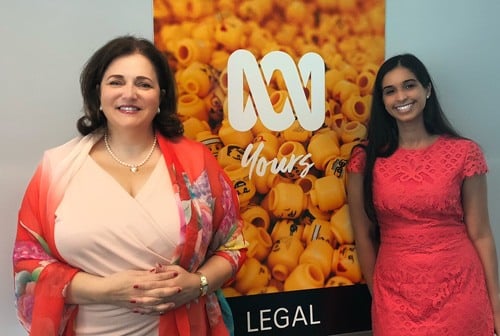On air and online: Australia
Applying old laws to new technology is a constant struggle for lawyers the world round. Heading to the Australian Broadcasting Corporation (ABC) headquarters in the heart of Sydney, GC’s Harveen Kaur catches up with general counsel Connie Carnabuci to find out how social media is transforming industry practices.
Whilst sitting on a train travelling across the iconic Harbour Bridge towards the ABC building, I pulled out my smartphone to capture a photo of the view. Within minutes that shot was posted to my Instagram account – a simple impulse merely reflective of a greater social change triggered by technology.
Social media and the way audiences obtain their news has changed over the last decade. In Australia, this change has been particularly paramount after a recent landmark ruling regarding liability for comments made on social media sparked national debate around how media companies engage on online platforms such as Facebook.
Discussing this development and what in-house counsel working in the media industry should be aware of is Connie Carnabuci, general counsel of the ABC. The ABC is Australia’s national broadcaster, which although funded by the government, operates an independent and impartial news outlet.
The digital takeover
The law’s constant struggle to keep pace within an ever transforming digital age is not breaking news. Online content has been growing in prominence and overtaking traditional news distribution channels such as television and print for years.
‘The ABC has had to embrace social media because we need to go where our audiences are. So, you will find our content on a number of digital platforms. In fact, we have been real innovators in digital content in Australia. We launched our own catch up service, which is called ‘iView’, in 2008. We were one of the first to do that – if not the first,’ shares Carnabuci.
‘Now you will find our content not only on our own platforms but on our Facebook pages. You will also find our content on Apple news. We also have a collaboration in place with Alexa and Google Home using conversational user interfaces. And of course, we also have our own website, which we update with our own digital stories.’
‘So this is the brave new world, and the complexity of delivering content has really increased exponentially. It is no longer a single channel – there is almost an infinite number of ways to go to market with digital delivery.’
From a legal perspective, ensuring there are relevant structures in place to manage the digital output has been crucial.
‘So there has been quite an important cultural shift. We re-organised ourselves about two years ago. We used to be organised along platform lines – so radio, TV and digital networks. We are now platform agnostic, and we are organised along genres. Our main genres are: news analysis and investigations; entertainment and specialist – which is where you find kids, dramas and things like that; then we have regional and local – which covers sports, weather and special events; and then we got a really cool new group called the Content Ideas Lab – which is our very own ideas incubator.’
Social media etiquette
On the 24th of June 2019, the New South Wales Supreme Court of Australia ruled that media companies can be held liable for the defamatory comments made by third parties on their public social media platforms.
The ruling came after Dylan Voller sued multiple media outlets over alleged defamatory comments posted in reply to articles published about him on Facebook in 2016 and 2017. Voller had been a detainee at the Don Dale Youth Detention Centre in the Northern Territory, and news of his mistreatment at the centre sparked national outrage and a royal commission.
It was argued that media companies should have known about the risk of defamatory comments after placing the articles online and it was believed media companies should have done more to monitor or hide defamatory statements made by third parties.
Although the ABC news team were not directly involved in the incident, the results of the case had direct ramifications on how the media companies – such as the ABC – will use and engage with social media platforms.
‘The recent decision in Voller v Nationwide News Pty Ltd has the potential to impact our business and we will be closely watching the appeal,’ says Carnabuci.
‘So, this case could determine how we look at things and the level of responsibility of media companies. Are we responsible for random comments made by a third party in relation to a story, which is not defamatory? If we place that story on Facebook and third parties make comments which are defamatory of the person who is the subject matter of the story, are we then responsible for those defamatory comments?’
User generated content, such as enabling viewers to comment and like social media posts, has always been instrumental in driving online traffic to an organisation’s website. However, in light of the recent legal developments, media organisations may have to introduce stricter controls.
‘User generated content is a very exciting area for us. We have a flagship show at the ABC called Q&A. While this show is being broadcast, you can join the conversation live on Facebook,’ reveals Carnabuci.
‘This is exciting because it is a much more intimate experience for the audience, who actually get to become part of the content rather than have the content wash over them. So, the levels of engagement are really high. But now we also have to moderate all comments made by third parties.’
Finding a way forward
Greater supervision and moderation of third party commentary left across the ABC’s social media platforms will help minimise risk. But finding the delicate balance between opinion and defamation is a process that takes time, explains Canabuci.
‘That is something that we are currently stress testing. We have been trying to implement both a proactive and a defensive strategy. So, a proactive strategy would be: if you know you are going to be putting up content that is highly controversial, then you better be moderating or be very mindful if content suddenly starts trending.’
‘We are currently looking into some really cool technology to help identify and flag content that suddenly becomes a hot topic. For example, when there are lots of people commenting on a post. We need the technology, because we could never have enough manpower to moderate every single comment that is posted by every single person. So, the question we are looking into is how do we start to create some gateways or some filers that help evaluate anything that might be problematic online.’
Prosecuting the author of the defamatory comments is often not an option, because it is almost impossible to identify them.
‘So, the problem with these cases is even if you can make a legitimate legal claim against them, how do you find them? Where are they? These people are in the shadows, they are not necessarily in Australia or even in a jurisdiction that we can identify,’ she outlines.
‘That is the real challenge when you move into the internet space. A lot of these actors, they are not people who want to make themselves visible because they are doing the wrong thing. So, we are thinking very pragmatically about how we reduce the harm that could come to our audiences, what pragmatic solutions could we implement.’
Making things easier
As regulations around how social media platforms evolve and become clearer, the onus for in-house counsel to lead media companies through these changes will be fundamental.
‘As counsel, you are working hand in glove within all business areas to help achieve whatever is the most pressing thing that they need to achieve on any given day,’ says Canabuci.
‘When you are at a 24/7 news organisation, there is always a lot going on. So, our primary objective is to deliver a service that is meaningful to our audience. We also have to protect the independence of our journalism. Our first and foremost obligation under our charter is to provide impartial and accurate news reports to the highest journalistic standards.’
‘That is something that really excites me and I feel being part of that purpose is really rewarding, because in an age of ‘fake news’, there is so much information around us at the push of a button. So, knowing that you are working for an organisation that is actually putting out reliable content and information is very satisfying.’
No matter the appeal results for the Voller case, media companies will have to play a bigger role in monitoring their social media output. As news distribution channels evolve, so will the legal framework governing those channels.




